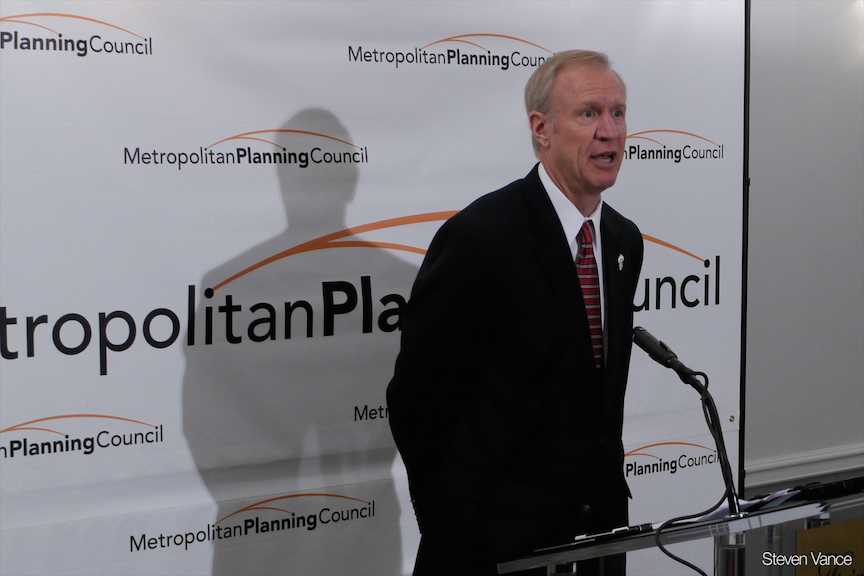Big Money’s Big Candidate
October 21, 2014
The image candidate Bruce Rauner has cultivated is somewhat unique: A Midwestern cowboy-businessman; a common man who rides Harley and wears plaid, whose morning alarm is an $18 Timex watch, whose first job was to flip burgers, and who will drive unions from Illinois and deliver the state from the jaws of the Rust Belt—assuring workers that he has a better deal in store for them.
But we see a different picture behind the scenes. Rauner was raised in Deerfield, IL and attended Lake Forest High School. He went on to graduate Summa Cum Laude in Economics at Dartmouth University, and later attended Harvard University for a master’s degree in business administration. He accrued his massive fortune (a net-worth close to $1 Billion) as Chairman of the private equity firm GTCR, and according to the Chicago Sun-Times he “owns nine homes, and made $53 million last year.”
While Rauner’s social policies are seemingly liberal for a GOP candidate, he “supports abortion rights…[but] won’t say where he personally stands on same-sex marriage. His economic policies lean far to the right: calling for something close to the abolition of public-sector union power, a decrease on corporate taxation, and an elimination of the ‘Quinn-Madigan 67% income tax hike’” according to his own website.
Perhaps Rauner’s most infamous political gaffe was a statement in which, according to Dave McKinney of the Chicago Sun-Times, Rauner “told a downstate audience that he was ‘adamantly, adamantly opposed’ to raising Illinois’ minimum wage and in December proposed moving Illinois’ rate back to the national $7.25-an-hour rate.” When the rather predictable controversy ensued, Rauner changed his pace and said, according to the same article, that “he’d be open to increasing the minimum wage if it was paired with business-friendly reforms.”
It is important, in any political campaign, to pay close attention to a candidate’s primordial first political statements. Like first impressions, they are very often telling of a candidate’s beliefs and intentions. The subsequent flipping is often damage control and defense against potentially campaign-derailing controversy.
Rauner called Union political donations “bribery” in his 2012 article for the Chicago Tribune titled, “Government Unions and The Downfall of Illinois.” That’s an off-putting statement from a candidate who has received $2.5 million—“the largest check to a political campaign in recent history,” according to Paul Blumenthal of the Huffington post—from hedge-fund executive Ken Griffin (who claims the wealthy have “insufficient influence” in politics) and over $150,000 in campaign donations from conservative advocacy group, Americans For Prosperity.
Now, I’m personally for abolishing all forms of campaign donations in favor of an equally sized cash-pool for all candidates but Rauner’s implied suggestion, to limit Union contribution yet allow Private Sector donations would create a lopsided political landscape funding only GOP candidates and fiscally conservative Democrats. It’s one of the most ruthless pro-business schemes in operation in this country and has had disastrous effects on workers’ rights and public welfare in both Wisconsin and Michigan, two states with similarly minded pro-business, anti-union governors.
Rauner’s fervent crusade against unions is reminiscent of one Scott Walker, a crude, dope-eyed bully and the Governor of Wisconsin who found himself in the national spotlight in 2011 when he destroyed the collective bargaining rights of Wisconsin’s public-sector employees. Eliana Johnson of the National Review noted that Rauner names “Scott Walker [among] his political mentors.” It seems fair, then, to compare the two.
Walker is an interesting character to call a mentor, and I don’t call him a “dope-eyed bully” for no reason. In a secretly taped session (which can be easily found on YouTube) on labor protests in Wisconsin, a figure impersonating David Koch said, “What we were thinking about was, uh, planting some troublemakers.” Walker’s response: “You know the, well, the only problem with that—because we thought about that—the problem with, my only gut reaction to that right now would be the lawmakers have completely had it with [the protestors]…my only fear would be is, if there was a ruckus caused, is that it would scare the public into thinking maybe the governor has got to settle to avoid all these problems.”
That’s sure some character reference right there. I don’t want to suggest Rauner might bear similar strategies to any hypothetical protest, but I know if I were running for governor I wouldn’t publicly call anyone who made such a statement a friend, let alone a mentor.
Anyone with a basic understanding of the Civil Rights Movement of the sixties or the history of the Nixon administration knows these shenanigans are nothing new to U.S. Politics—but they’re still a grave violation of the democratic process and of the public’s trust.
As far as I can tell Rauner is another candidate in the vein of Walker, Tom Snyder, or John Kasich of Ohio; pro-business to a fault, anti-union, and gravely dangerous to any kind of government. If he follows in their footsteps, if elected, we will see increased privatization of public resources and infrastructure, tax-cuts to the wealthy and to big business and the further decay of workers’ rights.









